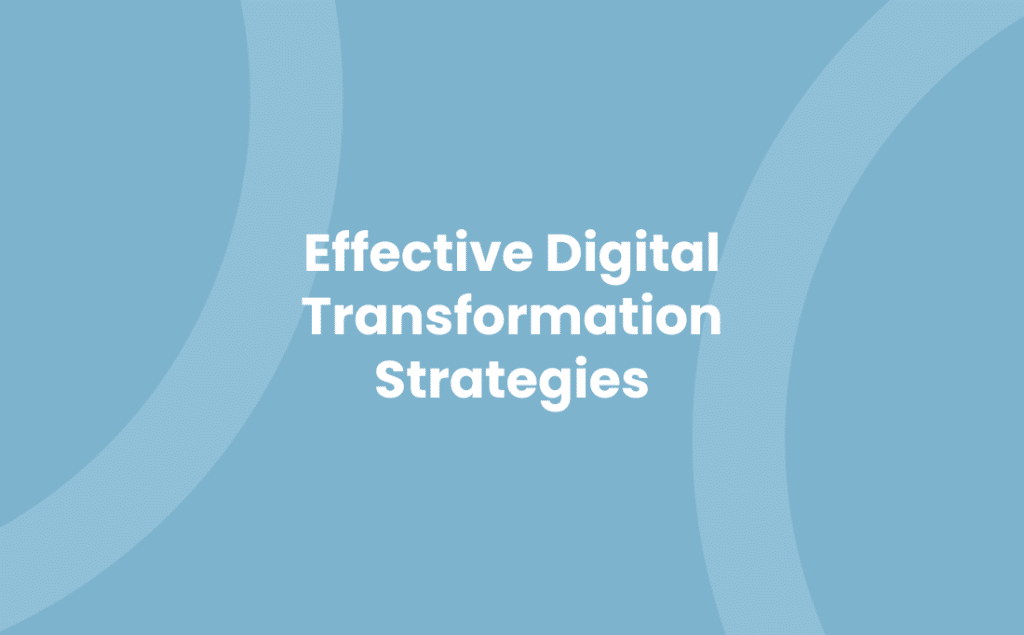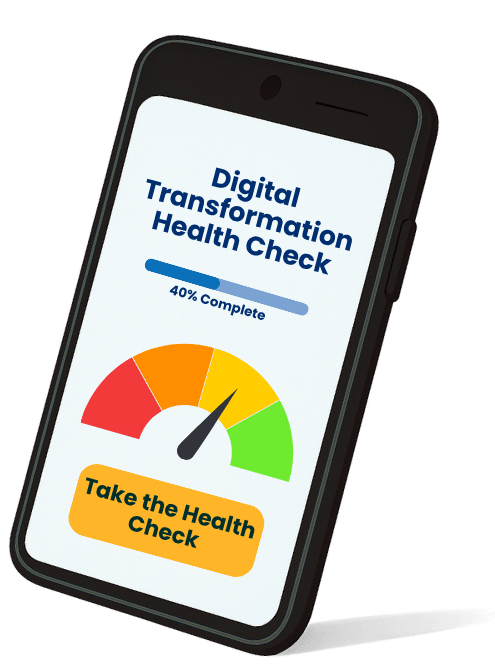Stepping into the world of digital transformation can feel like navigating a labyrinth. You’re not alone if you’re grappling with how to revamp your sales strategies for the digital era. But don’t worry, we’ve got your back.
In this ever-evolving digital landscape, it’s crucial to stay ahead of the curve. We’re here to guide you through the complexities of digital transformation sales strategies, ensuring you’re not just surviving, but thriving in this new age.
So, whether you’re a seasoned expert looking to refine your approach or a newbie eager to get it right the first time, this article is your compass. Let’s embark on this journey together, shall we?
Understanding Digital Transformation
To understand Digital Transformation, consider it as a radical rethinking of how a company uses technology, people, and processes to fundamentally change business performance. It is a move towards digitisation, the process of converting analogue information into digital form.
With regards to digital transformation sales, it is a strategy that redefines every aspect of sales operations. This includes your selling channels, sales force alignment, customer targeting, lead generation and overall customer experience. For instance, a notable example includes businesses spending more on digital ad campaigns instead of traditional advertising avenues like radio and TV.
Another innovation has been the amplification of online business platforms where sales occur in real-time via e-commerce sites, or through digital blueprints leveraging data-driven insights to target specific consumer bases. Reframe your thinking: Digital transformation is not just about embracing new technology, it is also about a shift in mindset.
Executives should examine the opportunities that digital technologies offer, striving for flexibility in their sales strategies. Emphasise creating an environment that champions real-time adjustments based on current data trends. For instance, if data points indicate an increase in mobile usage amongst target customers, swift adjustments to mobile marketing efforts can yield excellent results.
No two digital transformation journeys are the same. There are no definitive paths to follow or proven formulas to guarantee success. Each company must embark on an individual journey of transformation, as diversity reaps the greatest benefits.
While it may seem rigorous, digital transformation in sales strategy stands as a clever investment in the long run. It results in an agile, customer-centred organisation well-equipped for the dynamic digital era. It brings about significant improvements in customer satisfaction, a surging increase in sales and a lasting impact on your business in today’s digital transformation landscape.
Digital Transformation in Sales
Embarking on the journey of digital transformation sets you ahead in the sales arena. Digital transformation in sales employs an innovative approach, embracing state-of-the-art selling channels and pivoting customer experiences. This not just changes the game, but it also redefines it completely.
- Adopting Digital Sales Strategies: Businesses are rapidly turning to digital sales strategies. As a part of this shift, deploying digital tools and platforms aid in streamlining sales funnels. A prime example would be Customer Relationship Management (CRM) software. These digital powerhouses organise customer data, manage sales pipelines, and increase customer satisfaction, thus driving sales growth.
- Leveraging Data-Driven Insights: Businesses are putting digital transformation sales strategies into action using data-driven insights. This utilises predictive analytics to assess customer behaviour patterns, thereby refining sales strategies. For instance, using data science tools to predict customer preferences and habits helps in crafting more personalised marketing campaigns.
- Prioritising Customer Experience: Digital transformation in sales means putting the customer at the centre of your business. E-commerce platforms exemplify this, with chatbots to handle inquiries at any hour, personalisation to suggest relevant products, and seamless navigation for a smooth online shopping experience.
- Implementing Real-Time Adjustments: Digital platforms provide real-time data that can be used to evaluate the effectiveness of a sales strategy. It allows making immediate modifications in response to fluctuating market trends. Social media analytics is a bright instance of harnessing real-time data to tailor marketing content as per the customers’ evolving preferences.
To stand tall amongst competitors, it’s important to reimagine sales strategies through digital lenses. Digital transformation challenges traditional sales norms and unveils new opportunities. It’s about turning tables and becoming a leader in the sales industry. It’s about infusing technology into the fabric of your business, churning out not just benefits, but also setting benchmarks in customer satisfaction and business growth.
Key Digital Transformation Sales Strategies
Firstly, position technology as a key enabler of your strategy. Digital transformation sales strategies require an infusion of technology. In the current digital ecosystem, tech tools such as CRM and data analytics platforms offer valuable insights. Use these tools to optimise your customer interactions and fine-tune your sales strategies.
Secondly, adopt an adaptive approach. Flexibility remains critical in the face of rapidly shifting market dynamics. Rightfully so, an inflexible sales strategy in the digital space could obstruct growth. It proves pivotal to make real-time alterations based on market trends and customer behaviour analysis.
Thirdly, prioritise customer experience. In the heart of digital sales strategies, customer experience takes the limelight. Elements like e-commerce platforms, chatbots, and personalised marketing campaigns improve the overall shopping journey. Prioritise these elements to surpass customer expectations and boost customer loyalty.
Next, leverage new selling channels. Gradually, digital platforms continue to evolve, and with them, opportunities to reach target buyers. Make it a point to explore these possibilities. Keep an eye out for emergent digital selling arenas, like social commerce or influencer marketing.
Further, let data drive decision-making. In the modern business landscape, data rules. It probably informs everything from customer understanding to campaign planning. Use data analytics to garner quality insights and utilise these insights for better decision-making.
Lastly, maintain an ongoing commitment to digital transformation. Often, transformation isn’t a one-time event. Rather, it’s an ongoing process that requires dedication and continual adaptation. Make it your mission to continuously explore, learn, and adapt in the digital realm.
Through integrating these principles into your sales approach, you can effectively navigate the shifts in the digital selling landscape. While these strategies require considerable effort, they harbour potential for immense growth and business success.
Case Studies of Successful Digital Transformation Sales Strategies
Analysing real-life case studies often offers the best insights. Let’s look at three businesses that used digital transformation sales strategies to their advantage.
Firstly, the global technology giant, Microsoft, incorporated digital transformation in its sales approach. Through customer forecasting and predictive analysis objectives, the company increased its responsiveness to market trends and demands. Their custom digital sales strategies led to a 16% increase in revenues within a single fiscal year, showcasing the potential of digitally-driven selling.
Next, let’s consider the case of Starbucks who took a leap of digital faith by integrating AI into their customer app. They created a digital ordering system “My Starbucks Barista” and a personalised marketing strategy based on people’s orders. This bold move resulted in a significant uplift in customer app usage, resulting in a rise of 12% in total quarterly sales.
Lastly, the telecom mogul, Verizon, is another study that stands out. They replaced their traditional sales model with a state-of-the-art CRM system that focused on customer retention and upselling. Their efforts led to a 21% increase in sales, and customer satisfaction scores climbed by 10%.
These outstanding figures underline how digital transformation sales strategies can propel a business forward in today’s digital era. Make no mistake, digital selling isn’t a fleeting trend but a change that’s consuming corporate selling models. These studies provide a glimpse into the digital future of sales, and the road to success lies in embracing these technologies. If businesses integrate these strategies, they’re likely to experience growth, and staying hesitant may mean being left behind.
Remember, the above examples are not anomalies but illustrative of the broader shift in successful sales practices. Emulating these strategies gives your business a significant advantage in this high-stakes digital age.
Overcoming Challenges in Implementing Digital Transformation Sales Strategies
It’s little surprise that the advent of Digital Transformation Sales Strategies presents its challenges. You may confront technical obstacles, resistance to change and lack of digital skills in your team. Don’t fret; there exist solutions to these hurdles to prepare you for a world increasingly reliant on digital sales strategies.
Technical challenges, first on your list, can put a dent in your digital transformation roadmap. If your infrastructure isn’t ready for such a substantial shift, you’ll experience difficulties. Painstakingly review your current IT infrastructure. Identify specific areas requiring upgrades and integrate supportive architecture for smooth functioning of tools such as CRM and analytics software.
Next, resistance to change remains a notable stumbling block. Many employees hesitate in shifting from familiar traditional methods to unexplored digital arenas. Don’t despair. Plan a comprehensive change management strategy. Carve a clear, attractive vision of the forthcoming digital future. Provide extensive training sessions and ongoing support to ease the transition and boost employee confidence to work with new technologies.
Lastly, a lack of digital skills hampers many businesses in their switch to digital sales strategies. Your team’s ability to interact effectively with new technology directly affects your sales’ digital wing. Invest in expanding your team’s digital skill set. Encourage employees to get certified in digital arenas like data analysis, machine learning, and so on.
For instance, coffee giant Starbucks’ digital transformation strategy primarily focused on user experience. They overcame resistance to change by investing in extensive training and education about the benefits and functionality of their mobile app. As a result, they’ve seen splendid engagement levels with the app, significantly boosting their sales.
Remember, implementing digital transformation sales strategies is a marathon, not a sprint. Therefore, patience, preparing employees for the shift, and continual investment in improving your technical infrastructure makes a difference. Such strategies allow you to tackle these challenges head-on and emerge as a winner in the digital transformation race.
Future Trends in Digital Transformation Sales Strategies
Peering into the crystal ball, a variety of exciting trends materialise. You can anticipate innovation, integration, and intelligent systems to shape digital transformation sales strategies in the future.
- Artificial Intelligence (AI) and Machine Learning: AI has already made its entrance into digital sales strategies. Machine learning algorithms analyse historical data, detect patterns, predict customer behaviour, for example, Amazon’s recommendation system. The trend to observe is the expanding application of AI. Expect AI to take on more significant roles in automating routine sales tasks, predicting sales trends, and personalising customer interactions.
- Greater Integration of Tech Tools: Tech tools like CRM, Data Analytics, and ERP often operate in siloes. Advancements in technology will foster deeper integration of these systems. Integration streamlines information flow from one system to another, enhancing efficiency while slicing redundancy. You’ll see a more seamless transition between applications, improving your overall sales process.
- Omnichannel Engagement: An omnichannel approach interacts with customers across multiple channels‚ online, on mobile, in-store‚ and creates a unified customer experience. This approach is becoming an expected part of a consumer’s shopping experience.
- Heightened Cybersecurity: With digital sales strategies comes enhanced cyber risk. This emphasises the need for robust cybersecurity measures. Future strategies will pay more attention to bolstering cyber defences as part of their digital sales initiatives.
These trends offer a glimpse into the future of digital transformation sales strategies. Stay one step ahead by adapting these trends to your sales approach. Remember that technical enhancements mean naught if your team lacks the digital skills to implement them. So, spend time investing in digital skill development too. Exciting times ahead in the world of digital sales! Adapting these leading-edge trends puts your business in the prime spot to ride the wave of the digital revolution.
Conclusion
So, you’ve seen how digital transformation can revolutionise your sales strategies. Companies like Microsoft, Starbucks, and Verizon are testament to this. With the right technology, such as CRM and data analytics, you can enhance customer experiences and drive revenue growth. But it’s not without challenges. Overcoming technical hurdles and resistance to change requires upgrading your IT infrastructure and investing in digital skills. Looking to the future, AI and Machine Learning are set to play larger roles, with greater integration of tech tools, omnichannel engagement, and heightened cybersecurity becoming the norm. It’s clear that to stay competitive, you need to adapt and invest in these digital skills. The digital revolution waits for no one. Get on board or risk being left behind.



